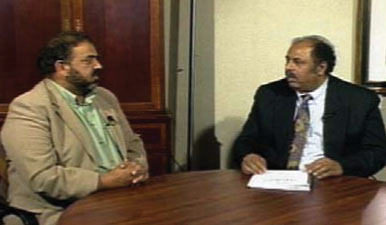AMA Internationalizes
Its TV Program
By Hazem Kira
 Lahore,
Pakistan: Launched in September of last year, the American
Muslim Alliance’s Global Forum TV program has recently
recorded nine panel sessions which will be aired in the coming
months on BRDIGES, RAVI, and Comcast in the United States,
and at least one major channel in South Asia and the Middle
East.
Lahore,
Pakistan: Launched in September of last year, the American
Muslim Alliance’s Global Forum TV program has recently
recorded nine panel sessions which will be aired in the coming
months on BRDIGES, RAVI, and Comcast in the United States,
and at least one major channel in South Asia and the Middle
East.
In the last week of December 2006, the much sought after TV
program, Global Forum, recorded over 12 hours of panel discussions
about Pakistani Elections 2007/2008 (three panels on “Legal
and Constitutional Considerations”, “Electoral
Issues and Actors”, and “Pakistani Political Parties:
Goals and Strategies”), Pakistani Culture: Debates and
Directions (three panels on “National Ideology and National
Identity”, “Pakistani Literature and National
Consciousness”, and “Media and Cultural Politics”),
and Pakistani Progressive Movement (two panels on “Pakistani
Left: Looking Back” and “Pakistani Left: Looking
Forward”).
The ninth panel, “C. R. Aslam: A Life of Perpetual Struggle”
was organized around a series of short interviews with and
about the 92 year revolutionary thinker C. R. Aslam who has
for the last seventy years played a major role in the articulation
of progressive politics in Pakistan. (GFTV is working on a
similar documentary about the life and times of late Dr. M.
T. Mahdi).
During these panel discussions, Dr. Agha Saeed, the host of
Global Forum TV, interviewed country’s leading thinkers,
political actors, and activists. (For details see www.GlobalFor
umTV.Net)
In the coming months, AMA’s Global Forum TV plans to
record similar programs in Central Asia, Middle East and Latin
America.
 Dr
Agha Saeed (right) interviews Lord Nazeer Ahmad
Dr
Agha Saeed (right) interviews Lord Nazeer Ahmad |
The
Global Forum TV (GFTV) focuses its programming on major world
issues, promising “Global Affairs from Global Perspectives”.
The AMA has bought its own equipment, assembled and trained
its own staff. With its main studio in Newark, CA, the GFTV
has access to a global network of studios and contacts. The
newly built studio makes it possible to produce its first-rate
news analysis program, documentaries, and highlight historical
and contemporary Muslim cultures, literatures and philosophical
traditions.
The importance of the AMA TV program, says Dr. Agha Saeed,
“can only be understood in a global context.”
This point, he says, became crystal clear during the recent
Israeli invasion. A number of journalists representing various
Pakistani TV channels, for example, ARY’s Dr. Shahid
Masood and Geo’s Asma Sheerazi were reporting live from
Beirut and Syria, respectively. This seemingly negligible
fact, says Dr. Saeed, has several major implications: Modern
technology has enabled Third World electronic media to collect
and report their own news and thus shed their dependence on
the First World news agencies. Now Third World channels offer
competing interpretations of global events. This new, healthy,
competition has enabled the global audiences to pick and accept
stories that fit more closely with their own sense of truth.
For a long time folks in Delhi, Islamabad or even Moscow had
to tune into BBC or Voice of America to get accurate news
about their own countries. Roughly 96 percent of the information
that flowed into Third World living rooms came from the First
World. Media that did exist, in the region, were either state-run
or state-controlled. However, with the recent heralding of
Al Jazeera, ARY and other alternative media sources with emphasis
on rigorous research and in-depth reporting a more responsible,
accurate and pluralistic media has arisen.
“Today,
the media in the Third World including the Muslim world is
able to tell their own story in their own words through their
own contacts and sources,” says Dr. Saeed.
Second, modern technology, funding, and greater autonomy have
made it possible to break this relationship of dependence
on news information. “Coverage of some (though definitely
not all) issues by the Muslim media has been more honest than
CNN, BBC, and Fox. Thus comparative view of these different
sources has ended Western media hegemony by adding another
side to the story (sometimes another set of stories) which
is beginning to create a totally different response among
those who previously had no means of knowing the other sides
of the story or the other story.” Populations in the
region can contrast the veracity of coverage from the various
media outlets, and more capably determine authenticity, accuracy,
and bias.
Al Jazeera's motto of "the opinion and the OTHER opinion"
has expanded the choices before the people in the region as
well as beyond the region without forcing them to subscribe
to any particular line. It is not at all surprising, therefore,
that only recently Israel prevailed on its new friend India
to ban Arab channels from being seen in India, just as former
Secretary of State Collin Powell had asked the Qatar government
to force Al Jazeera television to censor itself by eliminating
news items unfavorable to the West.
“These examples confirm that Israeli and Western commitment
to democracy is tactical and not principled. Equally importantly,
it shows that the budding Arab- Muslim media, though far from
being perfect, is beginning to have a global impact.”
-------------------------------------------------------------------------------------

